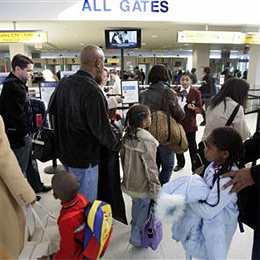 |
 |
 |
 News from Around the Americas | February 2006 News from Around the Americas | February 2006  
World Science Body Slams Tougher U.S. Visa Rules
 Tom Heneghan - Reuters Tom Heneghan - Reuters


| | Travelers pass through security at Newark International Airport. A leading world science body denounced tougher U.S. visa policies on Thursday after its Indian-born president said he failed to get permission to enter the country on charges he was hiding information that could be used for chemical weapons. (Reuters/Mike Segar) |
Paris - A leading world science body denounced tougher U.S. visa policies on Thursday after its Indian-born president said he failed to get permission to enter the country on charges he was hiding information that could be used for chemical weapons.

Professor Goverdhan Mehta, 62, an internationally recognized organic chemist invited to a conference by the University of Florida, has denied the charges and said he was rejected because he could not recall details of research he did 40 years ago.

The protest from the Paris-based International Council for Science (ICSU) came only a week before President George W. Bush was due to visit India with another scientific issue -- a planned civilian nuclear cooperation deal -- high on the agenda.

The ICSU and the U.S. embassy in New Delhi disagreed over details of the row. The embassy said it had not denied a visa but asked Mehta for more information on his work before his application can proceed.

The ICSU said Mehta had provided it with written proof his visa was denied and it complained that tough visa rules imposed after the September 11, 2001 attacks were keeping many foreign scientists from needed exchanges with their U.S. colleagues.

"The whole procedure is outrageous," said Carthage Smith, Deputy Executive Director of ICSU, an umbrella group of 133 national academies of science and international science unions. "He is not going to go on his knees and ask for a visa."

LESSER KNOWN SCIENTISTS

"Professor Mehta is a very well known scientist, but there are many lesser known scientists to whom this is happening," Smith said. "The bigger issue is important."

Smith said Mehta had been subject to "hostile treatment" at the U.S. consulate in Chennai, in southeastern India, when he applied for a visa and was asked to prove his work could not be used for chemical weapons.

"They said 'you're denied a visa,' gave him a form which says that but also says he can reapply," he said.

A U.S. embassy spokesman in New Delhi said the application had only been delayed: "He was asked for additional information and the application can be processed, it can be continued."

Mehta, a former head of the Indian Institute of Science who has taught in the United States, Britain, France, Germany and Japan, said the consulate accused him of hiding information that could possibly be used for chemical weapons when he could not give details of his doctoral thesis.

"I did my Ph.D 40 years ago," he told the Deccan Herald in Bangalore, the southern Indian high-tech center where he lives. "I told them I did not remember the topic. Science has progressed and changed completely since then."

The ICSU, which has coordinated major international research programs and promoted free exchange of scientists and their data since 1931, expressed "grave concern" over the case.

"It clearly illustrates that, despite some progress, all is far from well with regards to the visa policies and associated practices for scientists wishing to enter the U.S.," he said.

Additional reporting by Simon Denyer in New Delhi. | 
 | |
 |



